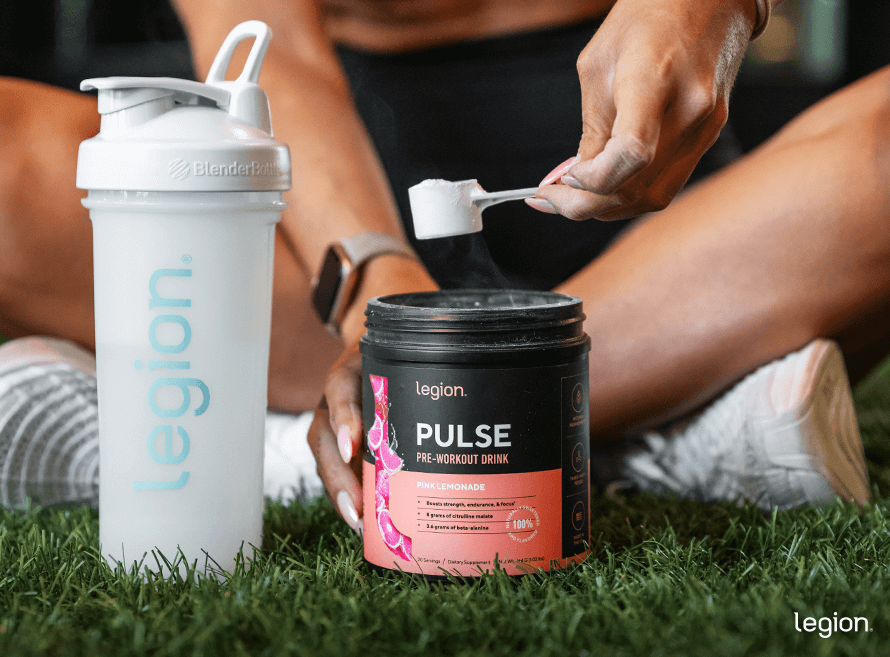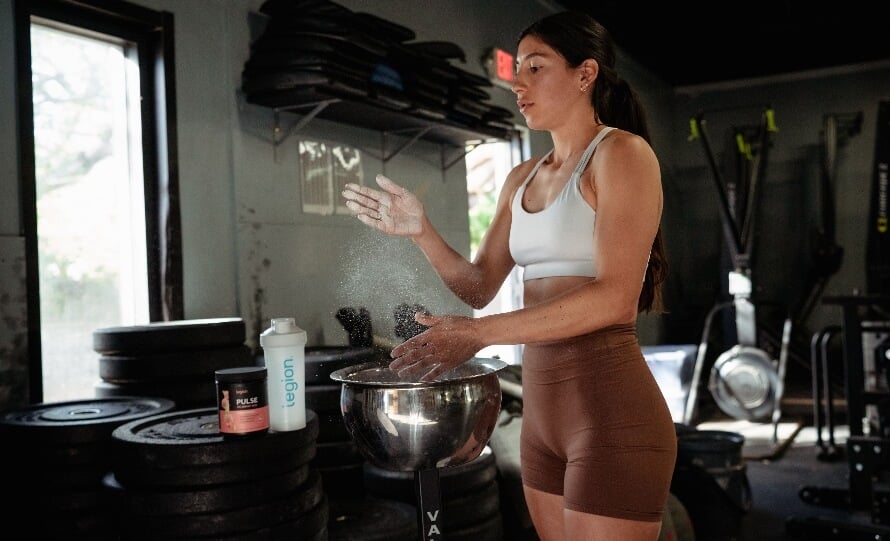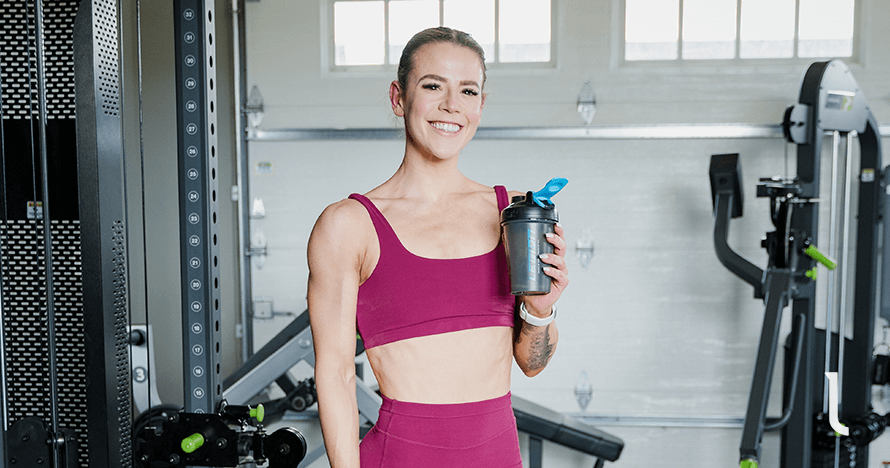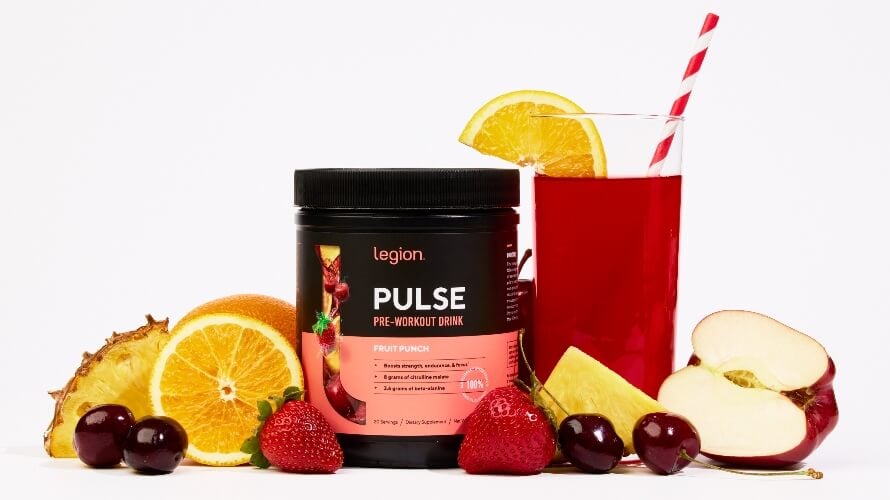
Pre-workout usually kicks in within 30–60 minutes.
That is, the most effective pre-workout supplements boost your performance most when you take them about half an hour before you train.
Having said that, caffeine—the ingredient with the biggest impact on performance—can take more or less time to take effect depending on what you’ve eaten, the type of supplement, and your sensitivity to it.
In this article, we’ll break down what affects how long pre-workout takes to kick in—and how to time it for the best results.
Key Takeaways
- Pre-workout usually kicks in within 30–60 minutes.
- Caffeine is the biggest variable in how long pre-workout takes to kick in. While it typically peaks around 60 minutes after ingestion, factors like what you’ve eaten, the type of supplement, and your sensitivity can affect when you feel it.
- How you take pre-workout affects its onset. Caffeinated gum works fastest (5–15 minutes), liquids like energy drinks absorb more quickly than pills, and pre-workout hits faster on an empty stomach.
- Dosage and expiration don’t change kick-in time. Taking too little caffeine just means you won’t feel the effects, but it won’t delay absorption. An expired pre-workout may be weaker but still kicks in within 30–60 minutes.
- You’ll know pre-workout has started working when you feel more alert, focused, and physically ready.
Factors Affecting How Long It Takes Pre-Workout to Kick In

While most pre-workout ingredients take 30–60 minutes to kick in, several factors influence exactly when you feel their effects. Some of these factors impact all ingredients, while others mainly affect caffeine.
The Contents of Your Digestive System
What’s in your digestive system affects how quickly your body processes pre-workout ingredients, which can alter how soon they kick in.
Taking it with a large meal—especially one high in carbohydrates—a thick drink like a smoothie or milk, or a large quantity of liquid can slow digestion, meaning it takes longer to feel its effects. This applies to all ingredients, especially caffeine.
Stomach pH can also impact how your body absorbs some ingredients, though the exact impact varies by ingredient.
If you want pre-workout to kick in faster, taking it several hours after eating with just water is usually your best bet. That said, taking pre-workout on an empty stomach can cause digestive system issues, which is something to bear in mind if you have a sensitive stomach.
Individual Variability
Your body breaks down caffeine using an enzyme called CYP1A2, but not everyone metabolizes it at the same speed.
Some people have a genetic variation that allows them to clear caffeine faster, meaning it leaves their system more quickly. Others process it more slowly, so caffeine’s effects linger for longer.
Genetics also influence “caffeine sensitivity,” which affects how intensely someone feels caffeine’s effects. For a highly sensitive person, it may seem like caffeine kicks in sooner or lasts longer than it actually does.
However, caffeine absorption follows a fairly consistent timeline for everyone—what varies is how quickly people feel and process its effects based on metabolism and sensitivity.
Delivery Form
Most pre-workout powders you mix with water kick in at about the same rate. If, however, you don’t use a pre-workout supplement, and instead get your pre-exercise boost from caffeine alone, then the delivery form matters.
For instance, caffeinated chewing gum works faster than capsules or pills because some caffeine is taken up through the mouth’s lining, bypassing digestion. This means you might feel the effects in as little as 5–15 minutes.
If you get caffeine from coffee or an energy drink—the latter of which is a popular substitute for pre-workout—you can expect it to kick in on a similar timeline to regular pre-workout supplements.
And if you’re wondering about the differences between getting your caffeine from an energy drink or a pre-workout, check out this article:
Pre-Workout vs. Energy Drink: Which Is Best for You?
Another method of taking pre-workout worth mentioning is “dry scooping,” where you toss a scoop of pre-workout powder to the back of your throat before chasing it with a swig of water.
People use this method for three reasons: to avoid drinking too much liquid before training, to dodge the taste of their supplement, or to make the pre-workout kick in faster.
While the first two reasons may be fair, the third definitely isn’t—dry scooping doesn’t speed things up in any meaningful way since the pre-workout still ends up in your stomach, just like if you’d mixed it with water.
Factors That Don’t Change How Fast Pre-Workout Kicks In
Some factors might seem like they’d change how quickly pre-workout kicks in, but they don’t actually make a difference. Two of the most common misconceptions are dosage and expiration:
- Dosage: Smaller doses don’t take longer to kick in—they just might not work at all. If you take too little caffeine or other active ingredients, you may not feel any noticeable effects, but the absorption rate remains the same.
- Expiration: Using an expired pre-workout may reduce its potency, but it doesn’t change how fast it kicks in. Ingredients like caffeine, beta-alanine, and L-theanine still follow the same absorption timeline—usually 30–60 minutes—even if they’re weaker due to age.
How to Know Your Pre-Workout Has Kicked In

You’ll know your pre-workout has started working when you feel an increase in energy, focus, and physical readiness.
For most people, the first sign is heightened alertness from caffeine, which can make you feel more awake and mentally sharp. If your pre-workout contains beta-alanine, you might also experience a tingling sensation on your skin—a harmless effect known as paresthesia.
As it fully kicks in, you may notice your heart rate rise, your muscles feel more “pumped,” and your fatigue fade.
What’s the Best Time to Take Pre-Workout?
To time your pre-workout properly, you need to know how fast the ingredients are absorbed, when they peak in your system, and how long they stay active. As such, this can be a little different depending on what your supplement contains.
That said, a good rule of thumb is to take your pre-workout 30–60 minutes before training. This gives the fast-acting ingredients—like caffeine and citrulline malate—time to kick in while making sure they’re still working during your workout.
To learn more about how long pre-workout stays effective, check out this article:
How Long Does Pre-Workout Last? Science Explained
What’s the Best Pre-Workout?

The best pre-workouts contain only proven ingredients in effective doses and are verified by independent labs to contain exactly what their label says.
And if you want a pre-workout that checks all these boxes, try Pulse.
Pulse is naturally sweetened and flavored and contains clinically effective doses of caffeine, L-theanine, citrulline malate, beta-alanine, alpha-GPC, and betaine. These are the six most research-backed pre-workout ingredients with more than 450 peer-reviewed studies supporting their efficacy.
Pulse also contains no added sugars, artificial sweeteners, flavors, dyes, fillers, or other unnecessary junk. And unlike most supplements on the market, every batch of Pulse is lab-tested for purity and accuracy and independently certified by Labdoor™ to meet or exceed FDA and WADA safety guidelines.
(If you’re uncertain whether Pulse suits your needs and budget, take the Legion Supplement Finder Quiz to learn what supplements are right for you. Click here to check it out.)
The Bottom Line on How Long Pre-Workout Takes to Kick In
Most pre-workouts start working within 30–60 minutes. The main thing that influences when it kicks in is caffeine. Caffeine’s effects are usually strongest about an hour after you take it, but that can change depending on how full your stomach is and how sensitive you are to it.
How you take it also matters. Caffeinated gum works fastest because the caffeine is absorbed through your mouth instead of your gut, while liquids like pre-workout, energy drinks, and coffee take effect faster than capsules or pills.
You’ll know your pre-workout has kicked in when you feel more alert, energized, and ready to train. And if it contains beta-alanine, you may also notice a harmless tingling sensation in your skin.
FAQ #1: How long does pre-workout take to kick in on an empty stomach?
Pre-workout kicks in faster on an empty stomach, typically around 30 minutes after you take it.
However, taking pre-workout on an empty stomach may cause jitters, nausea, or upset your stomach, especially if you’re sensitive to caffeine. If that’s the case, a small snack or a lighter meal may help reduce the downsides.
FAQ #2: How long does pre-workout take to kick in if you drink it slowly?
Drinking pre-workout slowly won’t significantly change how long it takes to kick in.
Caffeine and other active ingredients start absorbing as soon as they reach your intestines, so whether you drink it quickly or sip it over a short period, the total absorption time remains about 30–60 minutes. However, if you take too long to finish it—say, 30 minutes or more—you might not feel the full effects all at once.
If you want pre-workout to hit at the right time, it’s best to drink it within a few minutes rather than sipping it slowly.
FAQ #3: How long does stim-free pre-workout take to kick in?
Stim-free pre-workout takes about the same time to kick in as regular pre-workout—typically 30–60 minutes.
Since it doesn’t contain caffeine or other stimulants, you won’t feel the same sudden boost in energy or alertness. Instead, ingredients like citrulline malate, beta-alanine, and betaine work more gradually by boosting strength, increasing endurance, and reducing fatigue.
For a stim-free pre-workout containing clinically effective doses of 4 ingredients scientifically shown to increase strength and stamina and reduce fatigue and without the jitters, upset stomach, or post-workout crash, try stim-free Pulse.
Want More Content Like This?
Check out these articles:
Scientific References +
- Guest, Nanci S., et al. “International Society of Sports Nutrition Position Stand: Caffeine and Exercise Performance.” Journal of the International Society of Sports Nutrition, vol. 18, no. 1, 2 Jan. 2021, https://doi.org/10.1186/s12970-020-00383-4.
- Keller, J. “Gastrointestinal Digestion and Absorption.” Encyclopedia of Biological Chemistry, 2013, pp. 354–359, https://doi.org/10.1016/b978-0-12-378630-2.00106-7.
- Alsabri, Sami G., et al. “Kinetic and Dynamic Description of Caffeine.” Journal of Caffeine and Adenosine Research, vol. 8, no. 1, Mar. 2018, pp. 3–9, https://doi.org/10.1089/caff.2017.0011.
- Martins, Gabriel Loureiro, et al. “Caffeine and Exercise Performance: Possible Directions for Definitive Findings.” Frontiers in Sports and Active Living, vol. 2, no. 2, 11 Dec. 2020, https://doi.org/10.3389/fspor.2020.574854.
- Chvasta, T E, and A R Cooke. “Emptying and Absorption of Caffeine from the Human Stomach.” Gastroenterology, vol. 61, no. 6, Dec. 1971, pp. 838–43, pubmed.ncbi.nlm.nih.gov/5125686/.
- Nehlig, Astrid. “Interindividual Differences in Caffeine Metabolism and Factors Driving Caffeine Consumption.” Pharmacological Reviews, vol. 70, no. 2, 7 Mar. 2018, pp. 384–411, https://doi.org/10.1124/pr.117.014407.
- Fulton, Jacob L., et al. “Impact of Genetic Variability on Physiological Responses to Caffeine in Humans: A Systematic Review.” Nutrients, vol. 10, no. 10, 25 Sept. 2018, www.ncbi.nlm.nih.gov/pmc/articles/PMC6212886/, https://doi.org/10.3390/nu10101373.
- Wickham, Kate A., and Lawrence L. Spriet. “Administration of Caffeine in Alternate Forms.” Sports Medicine, vol. 48, no. S1, 24 Jan. 2018, pp. 79–91, https://doi.org/10.1007/s40279-017-0848-2.
- Gough, Lewis A., et al. “A Critical Review of Citrulline Malate Supplementation and Exercise Performance.” European Journal of Applied Physiology, vol. 121, no. 12, 21 Aug. 2021, https://doi.org/10.1007/s00421-021-04774-6.
